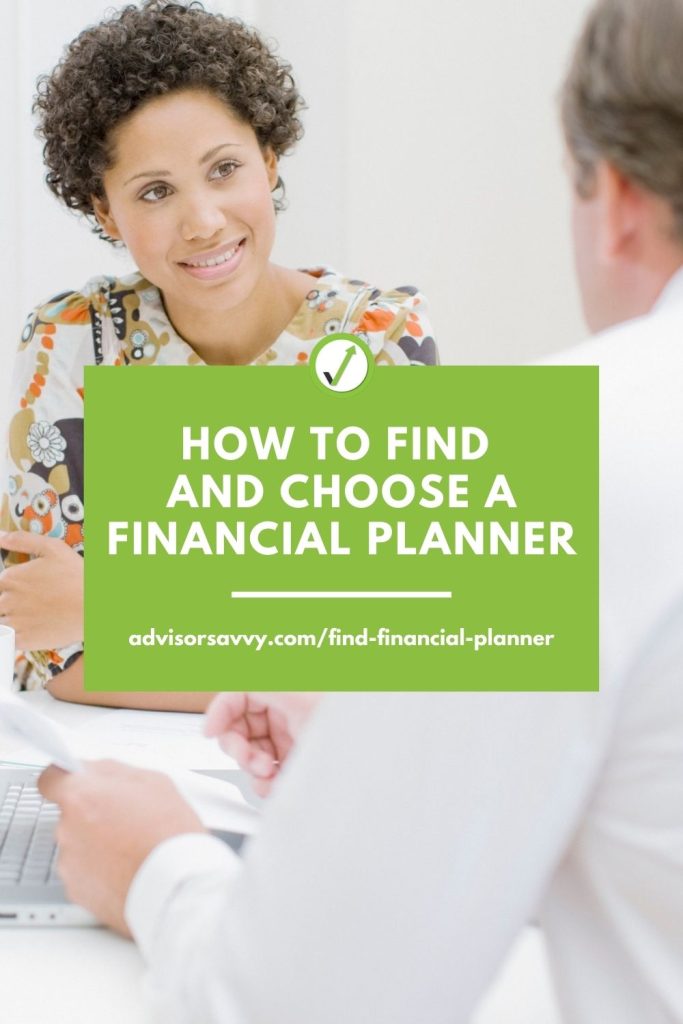
“Do I need a financial planner?” Many people find themselves asking this, especially when they hit particular milestones in their lives. Landing a high-paying new job, getting married, having a child, or retiring all come with plenty of financial questions and implications. In turn, a trusted financial planner looks at the long-term, helping you get a better picture of what your future could look like, and how to get there. Ready to find a financial planner that works best for your needs? Let’s look at the process.

Table of contents
What is a financial planner and what do they do?
The role of a financial planner is to help you clarify your financial and life goals, and give you a roadmap to reach them. Based on your income, they plan/manage your investments and insurance needs, and guide you towards a financially stable life and, eventually, retirement.
What is a certified financial planner?
Lots of letters at the end of a name look impressive. However, some of these abbreviations are much more important than others. Some will be meaningless to certain clients while important to others.
For example, you might see PFPC, CSC, IFIC beside a planner’s name. These are not designations, they are courses (specifically, Professional Financial Planning Course, Canadian Securities Course, Investment Funds Institute of Canada). While they do indicate additional, specified education, they are not professional designations. In reality, they are not particularly useful behind the name of an otherwise qualified planner.
The “gold standard” is a Chartered Financial Analyst (CFA). Consider this almost like a Master’s versus a Bachelors’s when it comes to the level of education. CFAs, because of their level of expertise, tend to work with high-level accounts and high net worth clients. In other words, not necessary for the vast majority of us.
Generally speaking, if you find a CFP (Certified Financial Planner) or an RFP (Registered Financial Planner), you can trust that you are in good hands. Bonus points if they have either a CFP/RFP or CFA, but both are not necessary to get quality support.
For reference, here is a handy glossary of financial certifications in Canada.
All of the letters after those in the glossary (IFIC, etc.) are gravy. Quite frankly, if an advisor or planner is padding their name with unnecessary letters that read like designations but aren’t, you might want to reconsider working with them.
When do you need a financial planner?
It’s an all-too-common misconception that in order to plan finances, you need to have significant finances to plan.
The truth? The right certified financial planner should be able to help you work towards meeting your financial goals, no matter what they are and no matter what your income level is.
Every income level can benefit from good financial planning. If you’re not sure whether you’d benefit from a certified financial planner, it’s time to start looking into hiring one.
How to find, choose, and hire a good financial planner in Canada
The pool of financial planners can seem like a vast abyss. You’re expected to find the perfect match for your unique finances like it’s a ‘needle in a haystack’ situation.
But that’s just one side of it.
Choosing and hiring a financial planner takes some self-reflection and due diligence on your part, too. One of the biggest mistakes a person can make when looking for a planner is not taking the time to first figure out what they need.
A little bit of work will go a long way in setting you up for long-term success.
Know and understand your needs
If you are going to a car dealership, you’re going to know before you walk in the door if you’re looking for a family vehicle or a sports car, if gas mileage is more important than zero-to 60 speed, and if you intend to lease or finance.
You need to have that same understanding of your short- and long-term financial needs before you start trying to find a planner to help you achieve those goals. Plans to start a family, travel the world, or retire early will all impact, not only your goals but the type of advice and plan you require. These are broad, general goals and yours are likely far more unique and specific.
By clarifying your goals, you will be in a much better position to find a financial planner you can trust.
Do your due diligence
The internet is a wonderful thing, but words on a screen — even a litany of online reviews — won’t give you the full picture of the financial planners you’re considering. The right planner for one person won’t make them qualified to help you achieve your goals.
Not all financial planners are created equal.
Certification
As mentioned above, there are certifications and courses planners can take to broaden their skillset and education. Make sure any planner you consider is a CFP (Certified Financial Planner), RFP (Registered Financial Planner), or CFA (Chartered Financial Analyst). Again, don’t be oversold by a laundry list of letters after a name. CFP, RFP, and CFA are the credentials to look for. Everything else, while valuable, are related to courses they’ve taken and specialties they’ve acquired.
Referrals
With the accessibility of online reviews, many people forgo traditional (and very valuable) word-of-mouth referrals — much to their detriment. Reach out to peers in business or members of your social network who are happy with their financial planners and can provide first-hand positive reviews.
When asking for recommendations, ask about accessibility (does the planner return calls and emails quickly?) and communication style. Is the financial planner proactive in making suggestions? Or are they reactive, and simply doing what is asked of them? What kind of success has the referrer had with them (portfolio growth, strong savings account, an upcoming trip to Maui)?
Online reviews are not without value but don’t rely on them exclusively. Asking a planner to provide the names of current clients will give you visibility into what it’s like to actually work with them.
Interview
This step is often missed in our busy lives, but it’s a big part of knowing you’re making the right choice.
Once you’ve done the initial legwork, you might feel confident in moving ahead. But this final step is important in making sure you’re choosing the right planner.
What should you ask your financial planner?
Here are some key things to discuss when interviewing a potential financial planner:
- Make sure they understand your financial goals.
- What is their plan is for your money? Where, why, and how it will be invested?
- Have them explain any special qualifications they have and specific areas of expertise.
- Ask what separates them from other planners.
- Ask what level of service and communication schedule you can expect: Monthly check-ins? Annual? As needed?
- What is their track record? Have they received any awards? Any results they’re exceptionally proud of?
- Discuss their client base — how many people are they working with at any given time? How large are their average client portfolios?
- What’s the payment structure — fee-based or commission?
At the end of the day, listen to how their responses satisfy your questions, and most of all, listen to your gut.
How much does a financial planner cost or charge?
There are different types of payment structures for financial planners. Some charge an hourly or flat rate based on the work they do for you ($100-$400 on average), others receive a fee that’s a percentage of assets under management, while others receive no payment directly from you, making a commission from the products they sell. In Canada, the latter is the most common.
What are fee-only financial planners?
In your search for a financial planner, you might come across the term ‘fee-only.’ Under this model, their income comes solely from their clients, via hourly fees or one flat fee. Since they are not trying to sell you specific products, they are typically more independent, have greater transparency with respect to fees, and will offer a more customized plan for your finances.
One thing to keep in mind: there is no inherent value judgment on a fee-based or commission payment structure. Your comfort zone might dictate how you feel about the way your planner benefits financially from their relationship with you. So don’t be shy. Ask how they make money from you. After all, you’re going to them to ask how to best maximize, save, and grow your money. Knowing how much of it goes to them is more than fair.
How often should you meet with your financial planner?
Once you’ve gone through the process of choosing a financial planner, you might be wondering how often you’ll meet. The general, most-frequent recommendation is an annual check-in on your finances. Much like how you go to the doctor for an annual check-up, a once-a-year meeting with your financial planner can help you assess your situation and where you might go from there.
Additional meetings might be warranted if you have a large portfolio or after a significant event — for example, receiving a large inheritance, getting married/divorced, or having a child.
We’ve said it before, and we’ll say it again: finances are not once-size-fits-all. Many planners will make suggestions based on client needs and wants. This also applies to how you’ll meet, be it over Zoom or at the office.
Financial planning is a lifelong process
Like all good relationships, life situations change, people change, external factors change. The reason you initially hired your financial planner might not be the reason you need one down the line. Maybe you’ve moved, changed careers, had a family, or retired.
Ultimately, as explained above, expect and insist on regular touchpoints to go over your needs, your goals, and your portfolio. You should feel like one of their most important clients — and that your business is valuable — at all points in the relationship, not just when you first start working together.
Reassess the relationship regularly. Are you still getting the high level of service you expected at the beginning of the relationship? Are they asking you the right questions to ensure you’re still on the same page?
Revisiting your own needs, and your financial planner’s ability, availability and commitment to helping you meet them, is an ongoing process. It’s a commitment you can and should expect any quality planner to guide you through on your journey to financial security and stability.
Ready to find a financial planner? Advisorsavvy can help! Just complete our easy questionnaire.
